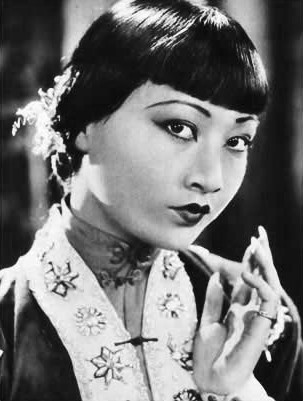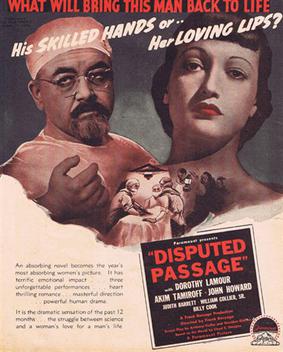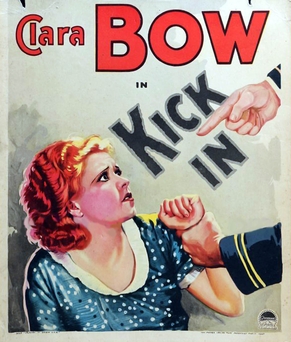
The Good Earth is a 1937 American drama film about Chinese farmers who struggle to survive. It was adapted by Talbot Jennings, Tess Slesinger, and Claudine West from the 1932 play by Owen Davis and Donald Davis, which was in itself based on the 1931 novel of the same name by Nobel Prize-winning author Pearl S. Buck. The film was directed by Sidney Franklin, with uncredited contributions by Victor Fleming and Gustav Machaty.

Wong Liu Tsong, known professionally as Anna May Wong, was an American actress, considered the first Chinese American film star in Hollywood, as well as the first Chinese American actress to gain international recognition. Her varied career spanned silent film, sound film, television, stage, and radio.

Dragon Seed is a 1944 American war drama film, about Japan's WWII-era actions in China.The movie directed by Jack Conway and Harold S. Bucquet, based on the 1942 novel of the same name by Pearl S. Buck. The film stars Katharine Hepburn, Walter Huston, Aline MacMahon, Akim Tamiroff, and Turhan Bey. It portrays a peaceful village in China that has been invaded by the Imperial Japanese Army during the Second Sino-Japanese War. The men in the village choose to adopt a peaceful attitude toward their conquerors, but the headstrong Jade (Hepburn) stands up to the Japanese.

The Hatchet Man (1932) is a pre-Code film directed by William A. Wellman and starring Edward G. Robinson. Warner Bros. had purchased the David Belasco/Achmed Abdullah play The Honorable Mr. Wong about the Tong gang wars. Made during the few years before strict enforcement of the Production Code, The Hatchet Man has elements that would not be allowed later, such as adultery, narcotics, and a somewhat graphic use of a flying hatchet.

Daughter of the Dragon is a 1931 American pre-Code crime mystery film directed by Lloyd Corrigan, released by Paramount Pictures, and starring Anna May Wong as Princess Ling Moy, Sessue Hayakawa as Ah Kee, and Warner Oland as Dr. Fu Manchu. The film was made to capitalize on Sax Rohmer's then current book, Daughter of Fu Manchu, which Paramount did not own the rights to adapt. Despite being the starring lead and having top billing in this film, Wong was paid only $6,000, half the money for her role that Oland was paid for his, even though Oland had less screen time than Wong. In a 2020 article about Wong, O, The Oprah Magazine linked this discrepancy to racism.

Daughter of Shanghai is a 1937 American crime film directed by Robert Florey and starring Anna May Wong, Charles Bickford and Buster Crabbe. Unusually for the time, East Asian American actors played the lead roles. It was also one of the first films in which Anthony Quinn appeared. In 2006, Daughter of Shanghai was included in the annual selection of 25 motion pictures to be added to the National Film Registry of the Library of Congress.

Anna May Wong was an American actress of Chinese heritage, who grew up in a culturally diverse neighborhood adjacent to Chinatown, Los Angeles. Her father believed in exposing his family to the creative arts, and often took them to see traditional Chinese stage productions. Young Anna, however, was fascinated by the emerging film industry in the area, and would fantasize herself as a movie actress like Pearl White or Mary Pickford. Her daydreams began to look like an achievable goal when local Baptist minister James Wang, who often worked with the film productions, recommended her as an extra in the Alla Nazimova silent production of The Red Lantern. Wong was only 14 years old, and eventually left school before graduating. While still a teenager, she was cast in the lead role of Lotus Flower in The Toll of the Sea.

Disputed Passage is a 1939 American drama war film directed by Frank Borzage and starring Dorothy Lamour, Akim Tamiroff, John Howard, Judith Barrett and William Collier, Sr. Set in war-torn China, the film was described by The New York Times as a "lavish soap opera". The film was based on the best-selling novel of the same name by Lloyd C. Douglas, and was produced by Paramount Pictures.

Her Jungle Love is a 1938 American South Seas adventure film directed by George Archainbaud and starring Dorothy Lamour and Ray Milland. Portions of the film were shot at Palm Springs, California.

Frisco Jenny is a 1932 American pre-Code drama film directed by William A. Wellman and starring Ruth Chatterton and Louis Calhern. Its story bears a resemblance to Madame X (1929), Chatterton's previous hit film.

His Supreme Moment is a 1925 American silent drama film with sequences filmed in Technicolor, starring Blanche Sweet and Ronald Colman, directed by George Fitzmaurice, and produced by Samuel Goldwyn. Anna May Wong has a small role as a harem girl appearing in a play. The film is now considered lost.

New York Confidential is a 1955 film noir crime film directed by Russell Rouse starring Broderick Crawford, Richard Conte, Marilyn Maxwell, Anne Bancroft and J. Carrol Naish. Produced by Edward Small for release by Warner Bros., the film was inspired by the 1948 book New York: Confidential! by Jack Lait and Lee Mortimer.

White Woman is a 1933 American pre-Code drama film directed by Stuart Walker and starring Carole Lombard, Charles Laughton, and Charles Bickford. The screenplay concerns a young widow who remarries and accompanies her husband to his remote jungle rubber plantation. It is based on the 1933 Broadway play Hangman's Whip, written by Norman Reilly Raine and Frank Butler.

Kick In is a 1931 American pre-Code drama film produced by Famous Players–Lasky and distributed by Paramount Pictures. The film, based on the 1914 Broadway play by Willard Mack which had starred John Barrymore, was directed by Richard Wallace and starred the legendary Clara Bow in her last film for Paramount Pictures.

Black Hand is a 1950 American film noir directed by Richard Thorpe and starring Gene Kelly as an Italian immigrant fighting against the Black Hand extortion racket in New York City in the first decade of the 20th century.
East of Suez is a 1925 American silent drama film directed by Raoul Walsh and starring Pola Negri. It is based on a play, East of Suez (1922), by W. Somerset Maugham. The film was produced by Famous Players–Lasky and distributed by Paramount Pictures.

King of Chinatown is a 1939 American crime film directed by Nick Grinde and written by Lillie Hayward and Irving Reis. The film stars Anna May Wong, Akim Tamiroff, J. Carrol Naish, Sidney Toler, Philip Ahn, Anthony Quinn and Bernadene Hayes. The film was released on March 17, 1939, by Paramount Pictures.

Tip-Off Girls is a 1938 American crime film directed by Louis King, written by Maxwell Shane, Robert Yost and Stuart Anthony, and starring Mary Carlisle, Lloyd Nolan, Roscoe Karns, Buster Crabbe, J. Carrol Naish, Evelyn Brent and Anthony Quinn. It was released on April 1, 1938, by Paramount Pictures.

Undercover Doctor is a 1939 American crime film directed by Louis King, written by William R. Lipman and Horace McCoy. The film stars Lloyd Nolan, Janice Logan, J. Carrol Naish, Heather Angel, Broderick Crawford and Robert Wilcox. It was released on June 9, 1939 by Paramount Pictures.

Persons in Hiding is a 1939 American crime film directed by Louis King and written by William R. Lipman and Horace McCoy. The film stars Lynne Overman, Patricia Morison, J. Carrol Naish, William "Bill" Henry, Helen Twelvetrees and William Frawley. The film was released on February 10, 1939, by Paramount Pictures.



















